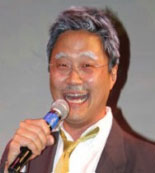

 Park interviewed as a cast member of Fox TV's "In Living Color."  Steve as the lamenting husband in The Karaoke Show |
| Behind The Scenes: | |
 |
Concert of Excellence 2004: Idea & Concept (October 2004) |
 |
Making Tracks - The Origins (September 2004) |
 |
Concert of Excellence (November 2003) |
 |
The Wedding Banquet Premiers in the US (September 2003) |
 |
The Wedding Banquet - On the Road (August 2003) |
 |
The Wedding Banquet - An Update! (July 2003) |
 |
The Wedding Banquet - Writing the Songs (June 2003) |
 |
The Wedding Banquet - Meet the Principals (May 2003) |
 |
Creating The Wedding Banquet (April 2003) |
 |
2g Meets Karaoke in a Comedy of Errors (March 2003) |
| Meet The Artist: | |
 |
Noriyuki "Pat" Morita - Beyond Mr. Miyagi (October 2004) |
 |
Woody Pak - Composer Extraordinaire (September 2004) |
 |
Lou Diamond Phillips - COE Honoree (November 2003) |
 |
Bai Ling - COE Honoree (November 2003) |
 |
Devanand Janki - Director, Choreographer, Actor (September 2003) |
 |
Jadin Wong - Dancer, Comedienne, Agent Extraordinaire (August 2003) |
 |
Steve Park - Comedian At Large (July 2003) |
 |
John Tillinger (June 2003) |
 |
Julie Danao (May 2003) |
 |
Cindy Cheung - An Actress of Many Talents (and Accents!) (April 2003) |
 |
Diane Paulus - Director and Co-Creator of The Karaoke Show (March 2003) |
 October 2004 Newsletter : :
Behind The Scenes : :
Meet The Artist : :
FAQ
October 2004 Newsletter : :
Behind The Scenes : :
Meet The Artist : :
FAQ
|
Steve Park once thought he would be a doctor. His father is one and, well, he is Korean, after all. Five years ago, Helen Hunt went to him with her infant daughter sneezing up a fit, and Steve correctly diagnosed little Mabel as being allergic to dogs. It was, however, the only diagnosis Steve has ever made and truth be told, he never went to medical school. Moreover, Helen Hunt doesn't actually have a daughter. But in showbiz, anything goes. On the set of the hit NBC sitcom Mad About You, Steve played the part of "Dr. Lee" to rave reviews in one of the many guest-starring roles he has taken on in his career. He has appeared on Friends, Murder, She Wrote, Spike Lee's Do the Right Thing and the Academy Award-winning film Fargo. Then there was Steve's starring role on Fox's memorable comedy show, In Living Color. These days, Steve can be seen in The Karaoke Show as Noah, lamenting his lost family as he wails The Beatles' "Yesterday" to the audience. All that, and Steve Park never even expected to be an actor. Though he did consider filmmaking, "acting and filmmaking were not legitimate career choices," Steve says, remembering the way in which he was brought up. Still, before he knew it, he "fell into acting" and graduated with a degree in theatre. Always the class clown, Steve then headed to New York to join the stand-up comedy scene. While the comedy route has helped him land great jobs on shows like In Living Color, it was hardly all fun and giggles. "It was something I felt obligated to do," Steve says. "Going to comedy clubs and performing was not my forte." Repelled by the racism and sexism often on display in stand-up - "comedy clubs tend to be about the lowest common denominator," he says - Steve ventured to L.A. and joined the star-studded cast of In Living Color. Though challenging and scary, working with comedians like Keenan Ivory Wayans and Jim Carrey "was like going to this party every day," Steve remembers. Along with Do the Right Thing and Fargo, Steve says In Living Color "mark different points in [his] career." And even though his role in Fargo took only one day to shoot, Steve said he treasured the rare opportunity to work with "fantastic artists" like the Coen brothers. Despite these well-received roles in highly-acclaimed productions, Steve has struggled to embrace acting as the means to make his living for the rest of his career. He has gone from moments of extreme conviction to times when he has asked himself, "what am I doing? I'm wasting my life." That loose hold came to a head in 1997, when Steve penned his controversial "mission statement," an open letter to Hollywood condemning the racism that still exists in the industry, specifically towards Asian Americans. It was a reaction, Steve says, to a "wound that just kept getting opened," culminating in a disturbing incident he witnessed on the set of Friends. The essay, intended for the Los Angeles Times, circulated throughout the internet. Steve became the darling of Asian American college conventions. Often the keynote speaker, Steve found himself at the center of an Asian self-empowering movement. Disillusioned with the "identity politics" he felt being waged, Steve has since retreated from his strong stance on race. "It began to feel like a certain ghetto-ization that was going on," Steve says. "There was a kind of paradigm where I was the victim." Yet Steve doesn't regret writing the essay. Today, Steve says, he doesn't feel the same kind of despair as he did six years ago. "A lot has changed," he says. "I think I have a lot more trust of the world today." Just as the industry has missed Steve's presence, so has Steve missed his art. Not long ago, he came to the conclusion that "I'm an actor, I need to continue to act," and started to audition again. The Karaoke Show is one of the first productions he's taken part in since his acting hiatus. The show's director Diane Paulus saw him in a short play reading and asked him to audition for the role of Noah, which he currently plays. The future for Steve Park is wide open. With casting directors unable to find him because they were told he's out of the business, Steve has been busy re-establishing himself in the industry. He acknowledges that being funny will always be old-hat and part of Steve's repertoire, though he concedes comedy doesn't - and never has - come easy to him. "Comedy for me is something that I don't quite understand for myself," Steve states. "It's still kind of a mystery to me." The mystery, Steve says, is that so many people think of him as a comedian when he doesn't consider himself very funny at all. "I have a tendency to get too serious about things," Steve admits. "Maybe comedy is my saving grace." |





